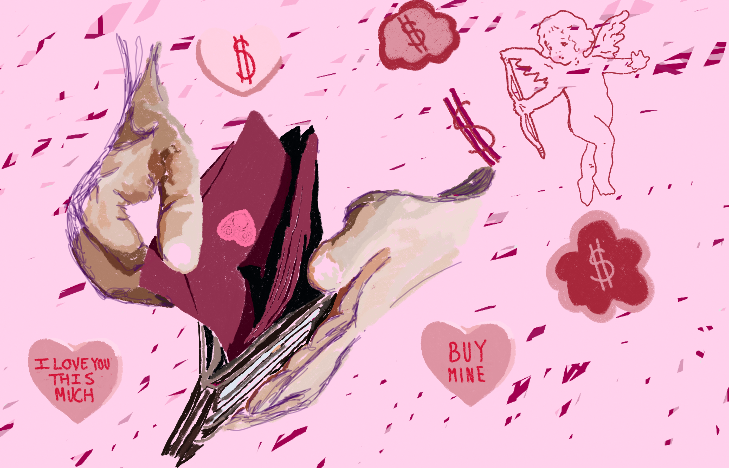Valentine’s Day can bring stress to students due to the pressure of consumerism, influenced by advertising and social media. However, with rising prices, some are turning to alternative mindsets and gifts this year.
Experts expect Valentine’s Day consumer spending to hit record heights at $27.5 billion in 2025 — a 6.6% increase from 2024. While this holiday may not make or break the overall economy, it can have significant effects on your budget as an individual spender.
Economics is a massive contributor to stress in America, but this holiday’s role in society diverges greatly from its origins.
The holiday itself has a cloudy history, containing vestiges from both ancient Roman and Christian traditions. This celebration often included violence in the form of animal sacrifices and a whipping ritual. People believed these actions induced fertility, and the ceremony included a matchmaking ritual, reminiscent of the holiday’s current sentiments. However, the shift from a celebration of tradition to the commercialized day we know today occurred in the late 19th and early 20th century.
Jeffrey Dorfman, a professor of agricultural and resource economics, said this evolution may be due in part to the rise of greeting card companies and retail marketing efforts.
“Stores that want to sell more stock advertised a whole bunch to convince us all we need to spend lots of money on Valentine’s Day,” Dorfman said.
Dorfman also weighed in on social media increasing the pressure many feel to spend on holidays such as Valentine’s Day.
“I think social media is responsible for a lot of the sort of peer pressure because even if you don’t see those people as your peers, which I think a lot of people don’t, it creates an unrealistic expectation,” Dorfman said. “So people think that’s normal life, but it’s really kind of not real life and mostly fake. But it makes people think that to live up to that standard, so then we probably end up spending more money.”
Anna Hirose, a third-year studying accounting, said the holiday can be a source of stress for her, but she also believes it to be valuable.
“Since I’m not generally the one paying for gifts and meals and stuff, I do feel like I have to do something in return, and I don’t know what’s adequate, or what’s enough or what’s appropriate,” Hirose said. “I think it’s important to celebrate the day, but I don’t think it should be a huge financial obligation.”
Rachel Kershner, a third-year studying business and international studies, said the meaning behind the holiday is the sentimental value behind actions of gift-giving.
“You don’t need to buy me something expensive if it has meaning for us. I feel like that should be the more important thing, not how much something costs,” Kershner said.
While the price of gifts are expected to rise this year, some alternatives don’t require exorbitant spending and still communicate one’s love for another. Dorfman recommended creating gifts for loved ones rather than buying flowers and chocolates.
“So I would take the personal approach — make a craft thing, bake cookies — give people coupons good for one favor or one cuddling up and watching a Netflix movie together or whatever,” Dorfman said. “I think there are lots of ways you can show thoughtfulness without spending a lot of money.













